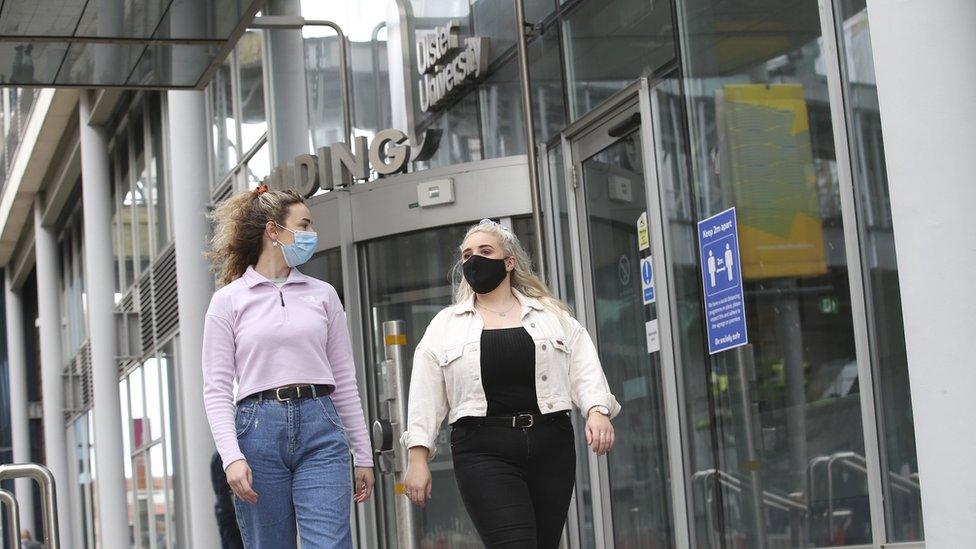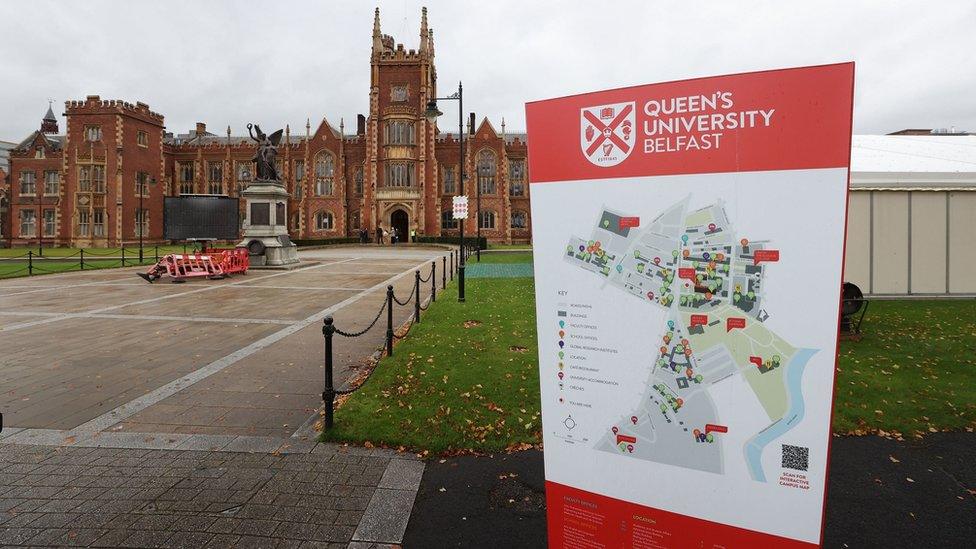Covid-19: Students plea to end 'unfair' rental contracts
- Published

Students in Northern Ireland are calling to be released from rent contracts early after their courses switched to online teaching.
Some students in private accommodation are being charged for rooms they cannot live in due to the lockdown.
The National Union of Students in NI said "students should not have to pay for accommodation that they are unable to access".
Students claim they are being treated "unfairly" by private landlords.
The NI Executive has advised students who returned home over the winter break not to return to their term-time accommodation, external until on-campus teaching is scheduled to resume.
Face-to-face teaching has been suspended for most courses, apart from some subjects where it is regarded as necessary.
Queen's University has extended a rent holiday for students living in their halls of residence until the beginning of March, while Ulster University is reviewing requests to leave student accommodation early on an individual basis.
Bethany Moore, a law student at Queen's, told BBC News NI she has a contract with a private landlord until August, which requires her to pay rent of £240 a month.
She said that while university accommodation providers have granted rent breaks, students renting in the private sector "have been left completely on our own during this pandemic".

Bethany Moore is a law student at Queen's University Belfast
"We've had no break. If the executive and universities are telling us not to come back to campus until we absolutely have to, then there needs to be some sort of solution for people that are paying rent for houses they can't get to."
Having moved back to her family home in Londonderry, she said she is using her student overdraft to keep up with rent payments.
In a statement, Queen's University Belfast encouraged students who are suffering financial difficulties as a result of the pandemic to access the University Hardship Fund for support.
"It's not appropriate to direct students to their hardship fund," Ms Moore said. "It's just not good enough."
In Wales, an extra £40m has been given to Welsh universities to help students struggling with rent and tuition fees.
In Scotland, the government introduced notice-to-leave periods that allows students in purpose-built student accommodation to leave their tenancy contracts with 28 days notice, while in England the government introduced a £20m hardship fund in December for students facing financial difficulties.
A spokesperson for the Department for the Economy said proposals for additional student hardship funding in Northern Ireland were recently brought forward for consideration by the economy minister.
'Our properties remain open'
Private halls provider Student Roost has offered a six-week rent discount to some of its residents from 5 January until 15 February.
It is the biggest private student accommodation provider in Belfast, managing four properties across the city, housing 1,190 residents.
It manages 53 student accommodation properties in 20 cities around the UK.
In a statement, Student Roost said its properties will remain open with "superfast broadband and parcel deliveries" so "residents are able to continue their studies, whether they're currently being delivered online or in-person".

Taniesha Clark moved home as NI entered another lockdown
Taniesha Clark, 19, a student at Ulster University, said she owes more than £2,000 in rent for her second semester, even though her course has moved online.
She was a resident at Great Patrick Street, one of Student's Roost's Belfast facilities, before moving home during the lockdown.
"They are not letting students cancel, even with the stay-at-home guidelines in place, because they claim that the Student Roost is our home," Ms Clark said.
She said she is expected to pay for facilities in the building that are included in her rates, such as social spaces and a gym that she "legally cannot use because of ongoing lockdown restrictions".
Ms Clark said Student Roost has "refused" to cancel her contract because the course is still going ahead and they would take further action if she does not keep up with payments.

Britney Burns lives in Scotland and cannot travel to her accommodation in Belfast
Britney Burns, a law student at Ulster University who lives in Scotland, is paying more than £3,000 for a room even though she does not believe she'll ever use it.
She said that while Student Roost delayed the start date of her contract, it is "refusing" to cancel her second term because the room is still available for use.
"I'm in a full lockdown but Student Roost has said education is an essential purpose to travel and because they have high-speed broadband I should do my classes there."
She said she does not feel safe travelling to Belfast and mixing with other students in shared housing.
"Any time I've tried to explain to Student Roost that my classes have moved online their response is that 'well you enrolled in a face-to-face class'.
'Rent rebates needed'
A spokesperson for the Student Roost said that residents who cannot travel back to their properties due to current restrictions and have been away from the property prior to 5 January can apply for a discount.

Face-to-face teaching has been suspended for most courses at NI's two universities
"Equally, all of our properties remain open. Many of our residents have stayed in our properties throughout the festive period.
"All Student Roost homes are designed for students to live with and make friends, build a community and have a safe and comfortable place to live and study."
Speaking to BBC News NI, a spokesperson for NUS-USI said: "We need rent rebates immediately to ensure that students are not out of pocket for rental payments of properties they are not living in.
"Students deserve better."
Halls rent holiday extended
Queen's has advised all students living in its halls of residence that they can continue to pause their residential contract until the beginning of March 2021 and the position will be kept under review.
"University accommodation remains safe and available for those students who do need to be on campus, along with all relevant services that are being delivered in accordance with public health guidelines," they said.
A spokesperson for Ulster University said students were made aware in August and November of which programmes required an element of on-campus teaching and that all other programmes could expect to move entirely online.
- Published9 October 2020

- Published28 March 2020
